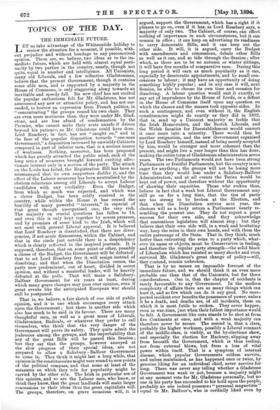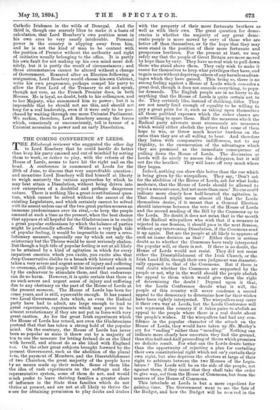TOPICS OF THE DAY.
THE IMMEDIATE FUTURE. TAET us take advantage of the Whitsuntide holiday to review the situation for a moment, if possible, with- out prejudice and without bondage to any preconceived opinion. There are, we believe, two ideas as to the im- mediate future, which are held with almost equal perti- nacity by two parties in the country, nearly, though not quite, equal in number and intelligence. All Unionists, many old Liberals, and a few reflective Gladstonians, believe that the present Government, though it contains some able men, and is supported by a majority in the House of Commons, is only staggering along towards an inevitable and speedy fall. Its new chief has not excited the popular enthusiasm felt for Mr. Gladstone, has not announced any new or attractive policy, and has not suc- ceeded, to borrow an expression from French politics, in " concentrating " the groups round his own chair. They are even more mutinous than they were under Mr. Glad- stone, and are less afraid of condemnation by the Premier, who cannot make their seats unsafe if driven beyond his patience, as Mr. Gladstone could have done. Lord Rosebery, in fact, has not "caught on," and in the face of the popular disposition towards "one-man Government," a disposition increased by unwieldy Cabinets composed in part of inferior men, that is a serious source of weakness. Nothing, moreover, has been proposed which has greatly attracted the public mind, each of the long series of measures brought forward exciting affec- tionate interest only in a section of the party. The attack on the Lords has failed, the Registration Bill has been so mismanaged that its own supporters dislike it, and the effect of the Labour measures has been neutralised by the obvious reluctance among old Liberals to accept Labour candidates with any cordiality. Even the Budget, from which so much was expected, and which was a clever Budget, has been coldly received in the country, while within the House it has roused the hostility of many powerful "interests," in especial of that great though unorganised. one, the very rich. The majority on crucial questions has fallen to 14, and even this is only kept together by severe pressure, and by promises of some kind to the Irish, which will not meet with general Liberal approval. It is believed that Lord Rosebery is dissatisfied, that there are diver- gencies, if not acute dissensions, within the Cabinet, and that in the circle just outside there is a despondency which is clearly reflected in the inspired journals. It is supposed, therefore, that on some point or other, possibly a clause of the Budget, the Government will be defeated ; that to set Lord Rosebery free it will resign instead of dissolving; and that when the Dissolution comes, the party now predominant, out of heart, divided in secret opinion, and without a masterful leader, will be heavily defeated at the polls. That will mean a Salisbury. Balfour Government for six years at least, during which many grave changes may pass over opinion, even if great events like the anticipated European war should still be postponed.
That is, we believe, a fair sketch of one side of public opinion, and it is one which encourages every attack upon the Government ; but there is another side which also has much to be said in its favour. There are many thoughtful men, as well as a great mass of Liberals, Gladstonians, Radicals, or whatever they prefer to call themselves, who think that the very danger of the Government will prove its safety. They quits admit the jealousies among the groups, and the improbability that any of the great Bills will be passed this Session ; but they say that the groups, however annoyed at the slow progress of their special ideas, are not prepared to allow a Salisbury - Balfour Government to• come in. They think it might last a long while, that opinion m the constituencies might veer round to new points of the political compass, and that some at least of the measures on which they rely for popularity might be carried by the other side. The Irish in particular are of this opinion, and so are the Labour men, who know, or think they know, that the great landlords will make larger concessions to their ideas than the great capitalists will. The groups, therefore, on grave occasions will, it is argued, support the Government, which has a right if it pleases to go on, even if it has, as Lord Rosebery says, a, majority of only two. The Cabinet, of course, can effect nothing of importance in such circumstances, but it can. remain in office ; it can keep on advertising its readiness to carry democratic Bills, and it can keep out the other side. It will, it is argued, carry the Budget with amendments and concessions, debate other Bills as well as it can, and so tide through the Session ; after which, as there are to be no autumn or winter sittings, it will have five months of comparative ease. During this long period it will earn as much popularity as it can, especially by democratic appointments, and by small con- cessions to labour; it may have an opportunity of doing something highly popular ; and in any case it will, next Session, be able to choose its own time and occasion for dissolving. A labour question would suit it exactly, or any act of imprudence by the House of Lords, or a defeat in the House of Commons itself upon any question on which the classes and the masses took opposite sides. In such a contingency, and even without it, the English, constituencies might do exactly as they did in 1892, that is, send up a Unionist majority so feeble that the Irish Home-rulers, and the Scotch Liberals, and Welsh fanatics for Disestablishment would convert it once more into a minority. There would then be another resignation, and the new Government organised, by Lord. Rosebery himself, instead of being merely accepted by him, would be stronger and more coherent than the present, and might live a year longer than this has done, making the entire term of Gladstonian administration seven years. The two Parliaments would not have been strong Parliaments or fruitful Parliaments, but the country is not eager for anything ; the groups will not be losing more time than they would lose under a Salisbury-Balfour- Administration, and at all events the Tories would be kept out of power, and therefore without the opportunity of showing their capacities. Those who reckon thus, believe in fact that a weak but Liberal Government may- still go on for a long time, that the ties of party are too strong to be broken at the Election, and that when the Dissolution arrives next year, the electors will as a body return a Parliament nearly re- sembling the present one. They do not expect a great success for their own side, and they acknowledge that contentious legislation will almost stop ; but they believe that their own side will, in a weak and hesitatino- way, keep the reins in their own hands, and with them thee entire patronage of the State. That is, they think, much, better than entrusting the reins to a party which, what- ever its name or objects, must be Conservative in feeling, and therefore the regular party strength—the solid block of Liberalism which has resisted so many shocks and even_ survived Mr. Gladstone's great change of policy—will, they contend, remain unbroken.
That is by no means an impossible forecast of the immediate future, and we should think it an even more- probable one than that of the Unionists, but for three considerations. One is, that the chapter of accidents is rarely favourable to any Government. In the modern complexity of affairs there are so many things which can hurt it, and so few which can do it any good. No unex- pected incident ever benefits the possessors of power, unless it be a death, and deaths are, of all incidents, those on which it is most futile to reckon. They never happer, even in war-time, just when their fullest importance would be felt. A Government like ours stands to be shot at from five Continents at once, and with a weak majority can therefore never be secure. The second is, that a class, probably the higher workmen, possibly a Liberal remnant of the middle-class, is visibly, as the by-elections show, and especially the election for Hackney, slipping away from beneath the Government, which is thus reeling, not from external blows, but from a loss of vital power within itself. That is a symptom of internal disease, which popular Governments seldom survive,.
and unless maintained, as has happened once or twice, by genuine liking for an individual chief, never survive for long. There was never any telling whether a Gladstone Government was weak or not, because a majority might at any moment vote for Mr. Gladstone personally, but no one in his party has succeeded to his hold upon the people, probably no one indeed possesses "personal magnetism" equal to Mr. Balfour's, who is cordially liked even by Catholic Irishmen in the wilds of Donegal. And the third is, though one scarcely likes to make it a basis of calculation, that Lord Rosebery's own position must in his own eyes be very nearly intolerable. Personal power in the country is slipping away from him, and he is not the kind of man to be content with the position of Premier without the authority and right of initiative usually belonging to the office. It is partly his own fault for not making up his own mind more defi- nitely, but it is partly the result of circumstances ; and those circumstances cannot be altered without a change of Government. Reseated after an Election following a resignation, Lord Rosebery would choose his own Cabinet, write his own programme, perhaps compel his party to allow the First Lord of the Treasury to sit and speak, though not vote, as the French Premier does, in both Houses. He is loyal, no doubt, both to his colleagues, and to her Majesty, who summoned him to power ; but it is impossible that he should not see this, and should not long for a real leadership, even if it were only to be pur- chased by waiting through one more Unionist Parliament. We reckon, therefore, Lord Rosebery among the forces which, consciously or unconsciously, tell in favour of a Unionist accession to power and an early Dissolution.







































 Previous page
Previous page